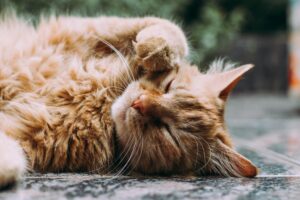
As we age, companionship and comfort become increasingly important to our quality of life.
While dogs are often celebrated for their loyalty, cats offer a unique set of benefits that make them ideal companions, especially for older adults. From their calming presence to their easy-going routines, cats provide a gentle, loving presence that can make later life healthier, happier, and more fulfilling.
Here’s a look at why owning a cat is particularly beneficial in later life.
Low-maintenance companionship
Cats are famously independent creatures, and their lower-maintenance needs make them well-suited for older adults who may not have the energy for the demands of high-energy pets. Unlike dogs, cats don’t need daily walks or constant stimulation.
They’re content lounging by the window, curling up on your lap, or playing independently with a few toys. For seniors with mobility limitations or health concerns, this independence makes cats an ideal choice.
Enhanced emotional well-being
Studies consistently show that pets can alleviate loneliness, anxiety, and depression, especially in older adults. Cats, with their gentle nature and steady presence, provide comfort and companionship that help ease feelings of isolation. Many older adults report a sense of purpose and joy in caring for their cats.
The simple act of petting a cat can release oxytocin, a hormone associated with happiness, relaxation, and bonding, which may help lower anxiety and foster a calm, positive atmosphere.
Health benefits
Believe it or not, cats can have a positive impact on physical health, too. Research has shown that cat ownership is associated with lower risks of heart disease and strokes. One study even found that cat owners have a 30% lower risk of dying from a heart attack than those who don’t own pets.
The soothing sound of a cat’s purr is not only calming but is also linked to lowering blood pressure and reducing stress. For those dealing with chronic health conditions, the presence of a cat can make daily life less stressful and more pleasant.
Improved routine and structure
Caring for a cat provides a simple yet meaningful routine, something that can be very helpful in later life. Feeding, grooming, and playing with a cat adds a gentle structure to the day, which can help keep seniors active and engaged.
A daily routine is known to have many positive effects on mental health, especially for those living alone. It helps create a sense of normalcy, encourages light physical activity, and provides a reliable focus that breaks up the day.
Sense of purpose and responsibility
Cats give their owners a reason to get up, move around, and engage in life. For many older people, particularly those who may be retired or have lost close friends or family members, this purpose can be incredibly meaningful.
Caring for a pet gives older adults someone to nurture, making them feel needed and valued. Even small interactions, like feeding, brushing, and talking to their cat, can offer a renewed sense of purpose and boost self-worth.
Enhanced social connection
Cat ownership can also open the door to social opportunities. Cat owners often enjoy sharing their experiences with other pet lovers, and this shared interest can help foster connections with others.
From visiting pet-friendly cafes or parks to joining local pet owner groups, having a cat can bring new social possibilities, helping older adults expand their social circles and combat isolation.
Adaptable to downsized living
Cats are typically quite adaptable and can thrive in a range of living spaces, from larger homes to small apartments. As many people in later life opt for downsized homes or assisted living communities, cats make an ideal pet choice due to their flexibility and minimal space requirements.
This adaptability makes it easier to keep a beloved pet companion even if living arrangements change.
Stimulating the mind and body
Cats are known for their playful antics and curious personalities, which can be endlessly entertaining and mentally stimulating. Playing with a cat can lift the spirits and provide some physical activity, whether it’s tossing a ball of yarn or teasing with a feather.
For older adults, these interactions help with maintaining dexterity, coordination, and cognitive engagement, which can be beneficial for mental sharpness and overall well-being.
Tips for older adults considering a cat
Adopt an Older Cat:
Adult or senior cats are often calmer and less demanding than kittens, making them a better fit for older adults.
Consider Low-Shedding Breeds:
Some breeds shed less than others, which can be beneficial for anyone concerned about cleaning or allergies.
Visit Your Local Shelter:
Many shelters have adult cats who would love a quiet, loving home. Plus, rescuing a cat adds a meaningful layer of fulfillment to pet ownership.
A cat can be more than just a pet – it can be a confidant, a source of joy, and a reason to embrace each day with positivity. In later life, when companionship, peace, and routine are more important than ever, a cat can be an ideal addition.
Their quiet presence and gentle purr can fill a home with comfort, companionship, and love, transforming daily life into a series of small, joyful moments. For those in later life, welcoming a cat might just be the purr-fect decision.
(Article source: Silver Surfers)

